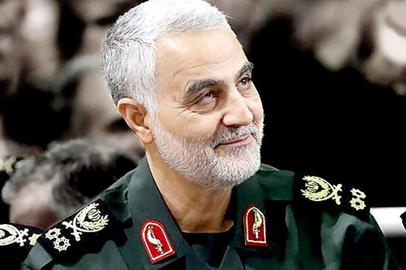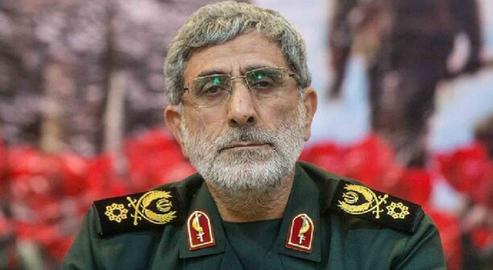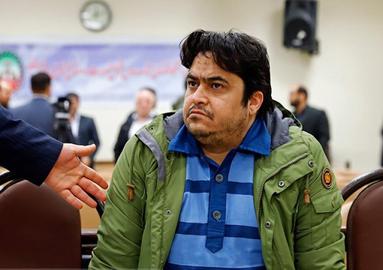Since the killing of Ghasem Soleimani, the commander of the Quds Force on January 3, analysts have been speculating about the future of this elite force, the extraterritorial branch of the Islamic Revolutionary Guards Corps (the IRGC).
Ayatollah Khamenei immediately appointed Soleimani’s successor, Ismail Qaani, on January 3. In his decree to appoint the new commander of the Quds Force, the Leader emphasized: “This force’s agenda will be exactly the same that existed under martyr Soleimani’s command.” But will the Quds Force be able to follow “exactly the same agenda” in future, or will the circumstances change in the post-Soleimani era?
The Quds Force’s Structure under Soleimani
The Quds Force is one of the four forces of the Islamic Revolutionary Guards Corps. The others are the Ground Force, the Navy, and the Aerospace (Missile) Force.
Ghasem Soleimani was not the first commander of the Quds Force, but after Ayatollah Khamenei appointed him to this position in 1997, the role gradually gained more importance within the Islamic Republic’s military and security apparatus.
A major reason for the force’s enhanced importance was the September 11, 2001 attacks on the United States, which took place four years into Soleimani’s tenure. In the post-September 11 era, the United States launched massive military operations on Iran’s eastern and western neighbors, and the Islamic Republic was extremely concerned about a possible attack by American forces. After the US invasion of Afghanistan in 2001, the Quds Force cooperated with the US endeavor to overthrow the Taliban, which Iran viewed as an enemy too. Iranian leaders and the Quds Force were also satisfied with the collapse of Saddam Hussein, another fierce enemy of the Islamic Republic of Iran. However, in the aftermath of the September 11 attacks, and in particular after the US invasion of Iraq, Iranian authorities came to the conclusion that if the American troops became well stabilized in Iran’s western and eastern borders, they might consider carrying out a third regime change project — this time in Iran.
As a result, Soleimani’s regional network gained decisive importance in Tehran’s deterrence strategy against the US and its regional allies, which required the Quds Force to extend its extraterritorial presence. This strategy emphasized that Iranian officials should not repeat Saddam Hussein’s mistake of desperately trying to use its regular army to fight American forces in Iraq. Instead, the Islamic Republic aimed to engage the US and its allies far from Iran’s borders, with the help of the Quds Force’s proxies throughout the Middle East.
In order to accomplish this mission, Ghasem Soleimani focused on developing the force's network in occupied Iraq, where the Islamic Republic's allies launched an overall campaign against the US Army. At the same time, the Quds Force strengthened its Lebanese and Palestinian allies so that they could take revenge on Israel if the Islamic Republic was attacked by the US. In this regard, the July 2006 Israel-Hezbollah War, during which half a million Israeli citizens were displaced, was the Quds Force’s projection of power along Israeli borders. In addition to Iraq, Lebanon and Gaza, the Quds Force expanded its network in Afghanistan, Syria, Yemen, and, according to some analysts, within some Persian Gulf countries too. After the beginning of the Syrian civil war in 2011, and then following the ISIS invasion of Iraq in 2014, the Quds Force established massive networks in both countries under Ghasem Soleimani’s command. Then the outbreak of the Yemeni civil war in 2015 further expanded the regional influence of the IRGC’s extraterritorial branch.
Despite the elimination of Ghasem Soleimani, the Quds Force’s regional network, which has been massively expanded under his command, is still in place in several countries. This network will undoubtedly remain active, no matter who commands the Quds Force. Supporting the extraterritorial branch of the IRGC is the uncompromising, strategic policy of the Islamic Republic of Iran. In particular, the Supreme Leader Ali Khamenei’s recent emphasis that “this force’s agenda will be exactly the same” reinforces that this policy will continue in the aftermath of General Soleimani’s death. The Iranian parliament’s decision on January 17, just four days after Soleimani’s killing, to provide an extra 200 million euros (about $US220 million) for the Quds Force also indicates the extent to which the regime is committed to this force in the post-Soleimani era.
Personal Importance of Soleimani
Despite the fact that the elimination of Ghasem Soleimani has not affected the Iranian regime’s dedication to support the Quds Force, one cannot underestimate the personal importance of Soleimani as an exceptional IRGC commander.
In fact, while the Quds Force is officially a subset of the Revolutionary Guards, Soleimani directly reported to the Supreme Leader, and not to the IRGC’s commander-in-chief. It’s worth mentioning that during Ghasem Soleimani’s commandership of the Quds Force, the Leader appointed three different IRGC commanders-in-chief, while Soleimani’s position remained intact. Soleimani’s official position was lower than that of the IRGC’s commander-in-chief and the chairman of the joint chiefs of staff, but in reality, his position was much higher than any other military commander.
Soleimani was the most well-known military commander in Iran, and possibly throughout the region. During his reign, he had established close personal relations with a great number of non-Iranian commanders who served in various militia and military forces. The family members of some of these commanders, for instance those of the Lebanese Hezbollah, were personally close to Ghasem Soleimani and his family. He was also quite popular among the personnel of Quds Force-backed regional groups. Soleimani was physically present at a number of the most dangerous Syrian and Iraqi battlefields, in which Iran-backed militants fought their Jihadi enemies. This presence, as well as his rather friendly behaviour with ordinary soldiers on the battlefield, had established an exceptional reputation for him among the personnel and commanders of Iran’s allies.
Ismail Qaani, the new commander of the Quds Force, is not a well-known IRGC commander. In fact, not only had Iran’s allies in the region not heard his name before, but many Iranian people and Iran analysts did not know Qaani before his appointment. Qaani played an important role in the Quds Force’s operations in Syria and Iraq, but he used to keep a low profile, and unlike Soleimani, has not had long-term relations with Iran’s allies in Arabic countries. A major reason for his limited contacts with the Arab World is that Qaani, during his Quds Force career, was mainly in charge of this force’s operations in Afghanistan, and not in Arabic countries (during the Syrian civil war, too, Qaani played a major role in mobilizing Afghan and Pakistani Shia militants who volunteered to fight alongside Iranian forces). As a result, Qaani does not speak Arabic well, which denies him from establishing Soleimani-style relations with Arab-speaking commanders and militants.
On the other hand, Soleimani, in addition to his specific importance as a military commander, had gradually become the second most powerful official in the Islamic Republic of Iran. His real power was not only more than other military commanders, but possibly more than the president who, according to the constitution, holds the highest position after the Supreme Leader. Several opinion polls over the course of the last few years reveal that Soleimani might have been more popular than any other official in the Islamic Republic. It is worth mentioning that on the eve and in the aftermath of the 2015 nuclear deal, the popularity of President Rouhani and especially Foreign Minister Zarif had significantly increased compared to other Iranian officials, but Rouhani and Zarif lost their public position after Washington’s withdrawal from the deal and the return of US sanctions, which led to unprecedented deterioration of the country’s economic conditions. In this new era, Ghasem Soleimani’s reputation saw improvement when compared with other Islamic Republic officials, not least because he even remained relatively popular with various groups of Ayatollah Khamenei’s critics (for instance, among some so-called reformists and moderates).
Given the above facts, it is very difficult to imagine that Ismail Qaani will ever become as influential as General Soleimani. This means that the new commander of the Quds Force will have fewer possibilities to use his personal influence as a leverage to advance this force’s policies within different government institutions.
However, the Quds Force’s mission and activities is such a crucial priority for the Iranian leader and regime that General Qaani, even with his less charisma and influence, will possibly not have huge obstacles blocking his way to undertake his missions.
At the end of the day, Qaani will need time to impose his internal authority, as well as his authority over the regional proxies of the Islamic Republic, and he will not possibly be able to become a commander at the level Ghasem Soleimani enjoyed. But it is also possible that under Ismail Qaani’s reign, the Quds Force’s operations in countries like Afghanistan, where Qaani has had more contacts, experience and expertise, will gain more importance in comparison to Ghasem Soleimani’s era.
This is article is part of Decoding Iranian Politics series. Read the other articles in the series
visit the accountability section
In this section of Iran Wire, you can contact the officials and launch your campaign for various problems


























comments